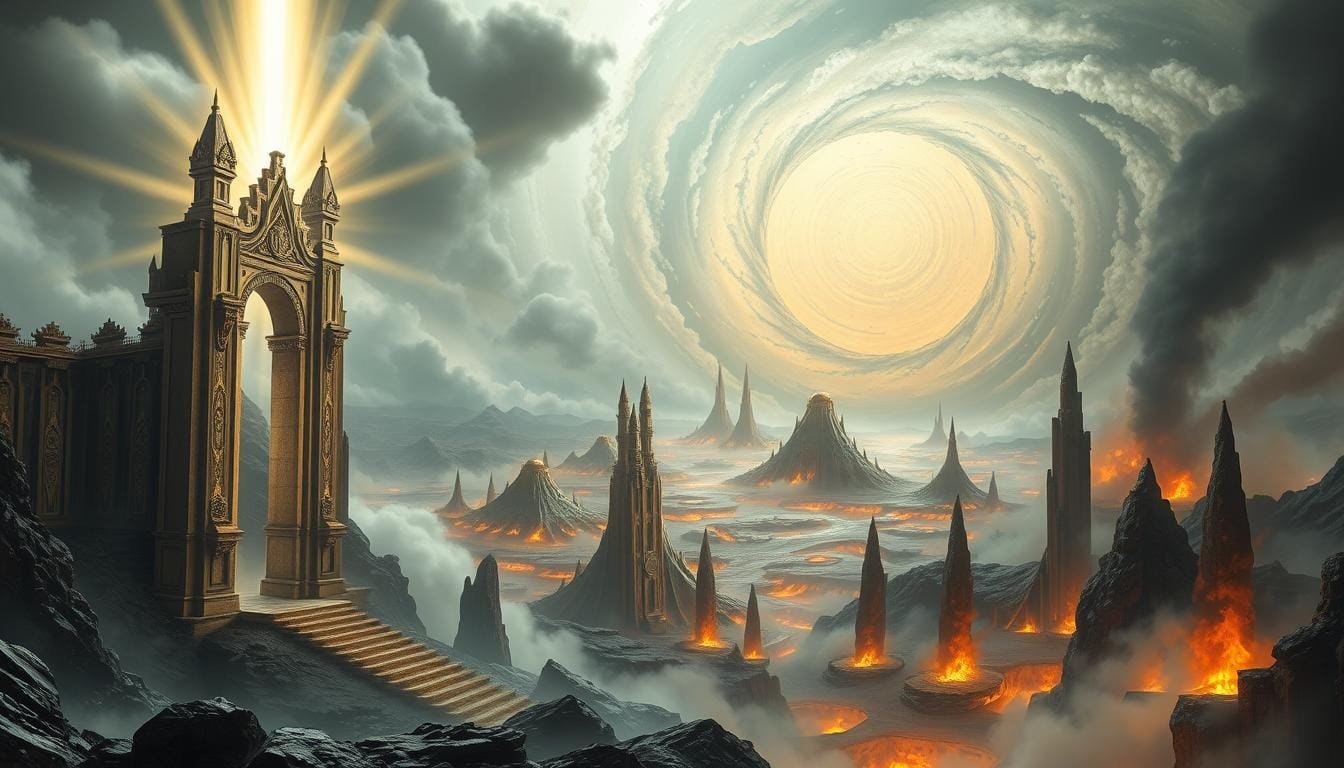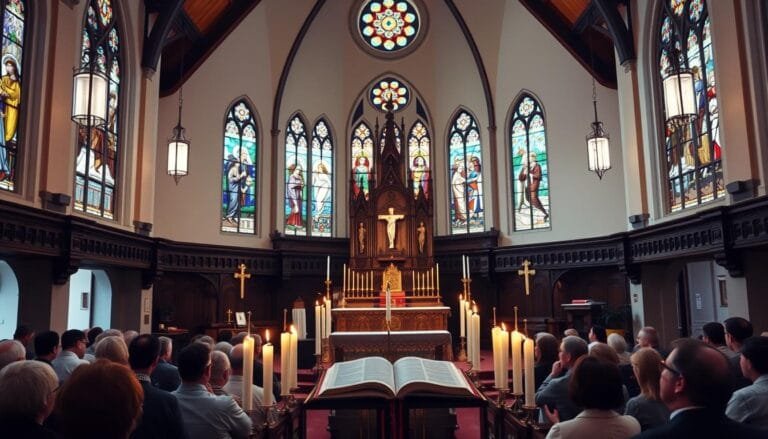Exploring the Realms of Heaven and Hell
This website contains affiliate links. As an Amazon Associate, I earn from qualifying purchases. The content on this website was created with the help of AI.
We Catholics aim for Heaven, a place of eternal joy and peace. We try to avoid Hell, a realm of punishment and suffering.
Heaven and hell show us the dualities of life, like light and darkness, joy and sorrow.
Our choices and actions have big consequences for our souls. Learning about heaven and hell can change us deeply, leading to spiritual growth and new insights.
As we explore Catholic teachings on heaven and hell, we can find Catholic prayers for the departed.
These prayers help us understand the afterlife from a Catholic perspective.
Thinking about heaven and hell makes us reflect on our actions and beliefs, showing how important they are for our personal growth and moral awareness.
Key Takeaways
- We believe that heaven is a realm of eternal joy and peace, symbolizing the ultimate destination for pure souls.
- Hell is portrayed as a realm of punishment and suffering, representing the consequences of a life led astray.
- Understanding heaven and hell can lead to profound spiritual insights and transformation.
- Our daily choices and actions have eternal consequences.
- Embracing the balance between light and darkness is crucial for achieving wholeness and harmony in spiritual evolution.
- The Catholic Church teaches that heaven is a state of supreme happiness and fulfillment, where the souls of the righteous will live in God’s presence for all eternity.
Understanding Heaven and Hell in Catholic Teaching
We explore the Catholic views on heaven and hell. Heaven is seen as a place of ultimate joy and fulfillment.
It’s where the righteous souls will live with God forever. On the other hand, hell is a place of eternal punishment and separation from God. It’s for those who have sinned.
The Catechism of the Catholic Church teaches that free will is key to our eternal fate and emphasizes the need for personal responsibility and moral choices.
The Bible teaches about heaven and hell. Heaven is part of God’s creation, as seen in Genesis 1:1.
The New Testament talks about believers being raised with Christ and becoming citizens of heaven, as in Ephesians 2:4-7.
But hell is seen as the end result of sin, a place of eternal damnation.
Purgatory is also a key part of Catholic teaching. It’s a process of purification before joining God fully. It’s not a physical place but a state where souls get ready for heaven.
As we learn about heaven and hell, we see how our choices affect our eternal home, leading to either heaven or hell.
The Beauty and Glory of Paradise
We often wonder about heaven, seeking to grasp its beauty and glory. The Catholic view of paradise shows us a place of eternal joy.
The righteous souls will live with God forever in heaven, which the Bible calls a “new heaven and a new earth,” a realm beyond compare.
The beatific vision is key to understanding heaven. The righteous will have the direct experience of God’s love.
This vision is a quick look and a deep, lasting connection with the divine.
Scripture reminds us that “eye hath not seen, nor ear heard, neither hath it entered into the heart of man, what things God hath prepared for them that love him.”
In heaven, we’ll see beauty beyond our wildest dreams, a glory that will last forever. The troubles of this life will fade away as we soak in God’s love.
The Bible says, “The sufferings of this life are not worthy to be compared to the glory to come.”
We’re promised a paradise of unmatched beauty, where every sorrow will be erased, and death, mourning, and sorrow will vanish.
Some of the key aspects of heaven include:
- Eternal joy and happiness
- Direct experience of God’s presence and love
- Unparalleled beauty and glory
- No suffering, death, mourning, or sorrow
We see God’s love for us in paradise’s beauty and glory, which makes us unique and special souls.
As we journey towards heaven, we’re reminded that the path to eternal joy is filled with delights greater than anything this world offers.
The Reality of Hell and Divine Justice
Many of us think about hell and divine justice a lot. We wonder what they really mean. The Catholic Church says hell is a place of eternal punishment and separation from God.
It’s where the souls of the wicked suffer for their sins.
People often think hell is just a myth or a figure of speech. But the Catholic Church believes it’s a real place. It’s a permanent separation from God, a punishment for sin.
Check out the Catechism of the Catholic Church for more on this. It says dying in unrepentant sin means going to hell.
Some important things to know about hell and divine justice are:
- Jesus’ teachings suggest many will choose destruction, while few will find life.
- Most of what we know about hell comes from the New Testament, showing a shift to eternal consequences.
- To enter heaven, one must become a new creation in Christ, showing the need for moral and spiritual growth.

Understanding hell and divine justice makes us think about our choices and actions. It pushes us to live a life that follows God’s will. This way, we avoid the eternal separation that hell represents.
Living Our Faith with Heaven in Mind
Living a virtuous life means our daily choices affect our future. We aim to make decisions that reflect our faith, with heaven as our ultimate goal.
C.S. Lewis believed our desire for heaven drives all our actions. Our faith guides us towards heaven through sacraments and prayer.
Living with heaven in mind means praying and being devoted. Receiving the sacraments, like the Eucharist and Confession, strengthens our bond with God.
Our choices, big or small, shape our eternal future, leading us to heaven or hell. Daily reflections and devotions offer guidance and inspiration.
- Making daily choices that align with our faith
- Receiving the sacraments regularly
- Practicing prayer and devotion
- Striving to live a virtuous life and avoid sin
By following these principles and staying true to our faith, we can make choices that positively impact our eternal future. This commitment leads us closer to heaven.

Conclusion: Embracing Our Eternal Purpose
As Catholics, we aim for heaven and avoid hell. Our choices shape our future. We must follow God’s will every day.
The Catholic Catechism helps us understand the Church’s teachings on the afterlife.
The Church teaches that our destiny is based on our free will and the state of our souls at death.
Living virtuously, embracing sacraments, and praying deeply can strengthen our bond with God, increasing our chance of eternal life in heaven.
The promise of heaven should motivate us to choose God’s plan over worldly desires. May we always remember our eternal purpose. Let’s strive to become the saints we are meant to be.










